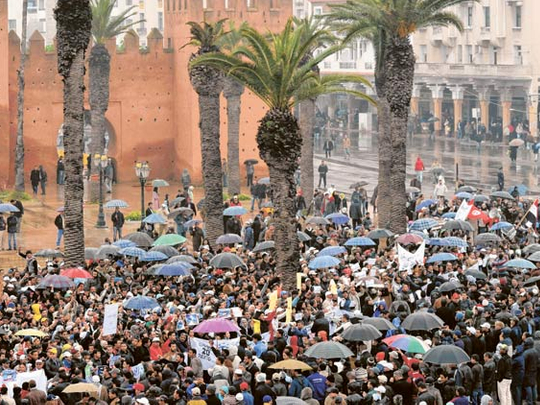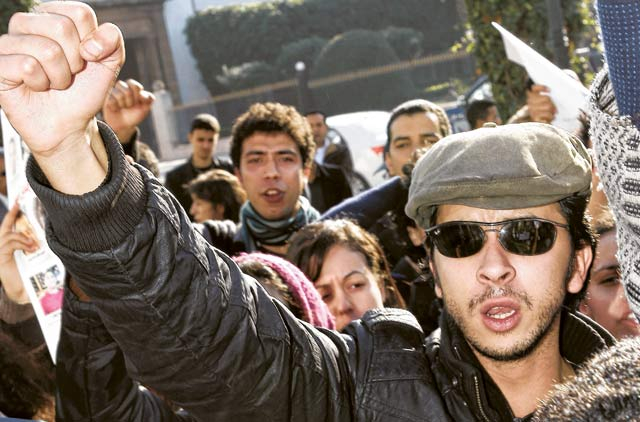
Dubai: With the continuation of the "domino effect" of the Tunisian protests held late last December followed by the massive demonstrations in Egypt across nearly all the region, the situation in Arab countries will never return to the pre-December status, analysts say.
Current protests, demonstrations and revolutions in several countries, each with different backgrounds and characteristics, do share many common factors, the political experts added.
Jordanian analyst Uraib Al Rentawi commented that after the Jasmine revolution in Tunisia and the January 25 revolution in Egypt: "I believe the Arab leaders will not rule as they did previously.
"This era [of former rules] has gone with no return," Al Rentawi said.
"In my opinion, the situation in all the Arab countries will never return to the status prior to developments in Tunisia and Egypt, even in countries that have not moved yet," Rentawi added in reference to the countries that have not yet witnessed public rallies to express opposition to the policies of their governments and to press for more rights.
During the past 10 weeks, rallies have been organised in almost all Arab countries from Morocco in the west to Bahrain in the east, calling for reforms, more freedom in different areas; political, social, economic and even constitutional amendments.
Rallies are becoming more of a daily development across nearly all the region, while the list of countries witnessing rallies is becoming longer with each passing day.
"On the surface, yes, there has been a domino effect," said UAE political science professor Abdul Khaleq Abdullah on developments in the Arab region.
But "I believe, one should be careful in realising that each case is an exceptional case," he added in an interview with Gulf News.
While protests take on an anti-corruption character in places such as Yemen and Algeria, the rallying took on a sectarian character in others such as Bahrain. However, attributing various rallies with particular features doesn't really do the situation justice.
"There are cases and cases, but all in all, the one thing that is true is that what happened in Egypt and what happened in Tunisia was inspirational for the 300 million Arabs," Abdullah continued.
"That is for sure. We (Arabs) are in (a road) with many curves, and we don't know what is going to happen at the next curve."
Prominent Bahraini analyst Ali Fakro told Gulf News: "The atmosphere," created by the two north African countries' revolutions earlier this year, "has undoubtedly broken the barrier of fear, (among Arabs and produced) enthusiasm".
Youth factor
Also, the emergence of the youth factor in the protests rather than members of political parties, has had a noticeable impact on the rest of the Arab countries.
However, the current rallies in Bahrain are to continue pressing for long-demanded freedoms and rights, he stressed.
"Even some of the slogans raised during the protests (in Bahrain) were borrowed from the Tunisian and Egyptian rallies," Fakro said in reference to the slogans that read "leave" or "People want to topple the regime".
However, Fakro refuted the description given to protests in Bahrain as sectarian rallies by Shiites against a Sunni regime.
"Undoubtedly, the people who took to the streets, are mainly Shiites, but many of their demands are shared by Sunnis as well," Fakro added.
"While the Shiites say they are being discriminated against and accordingly their voice is louder than others, other citizens, mainly Sunnis, put forward other issues, such as unemployment, housing and political naturalisation," Fakro said.
At the same time, many political experts, including Fakro, strongly believe that different characteristics of protests and rallies in different countries mean different ways out. Some countries, including Libya, have been violent in dealing with people's demands.
But in other countries such as in Bahrain, leaders have been trying to offer dialogue to the opposition and protesters and showing flexibility.
"Protests differ from one country to another like societies differ, as well as political regimes, reactions and the size of the rallies," Saudi analyst Khalid Al Dakheel said.
"The domino effect will continue for a long time (in the Arab region), and it is not necessary for this domino effect to take on a violent nature," Al Dakheel told Gulf News.













